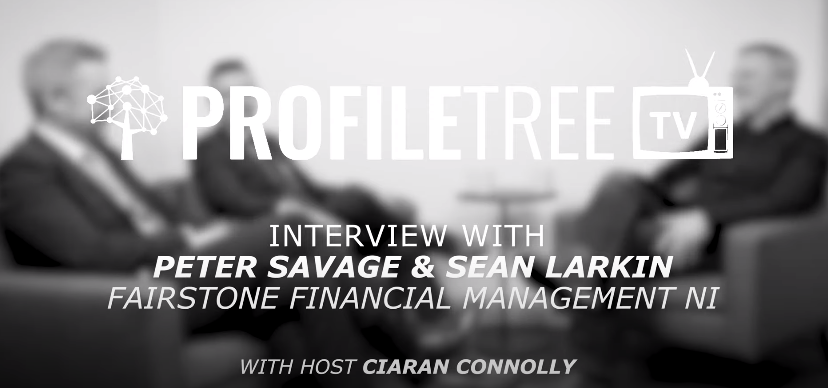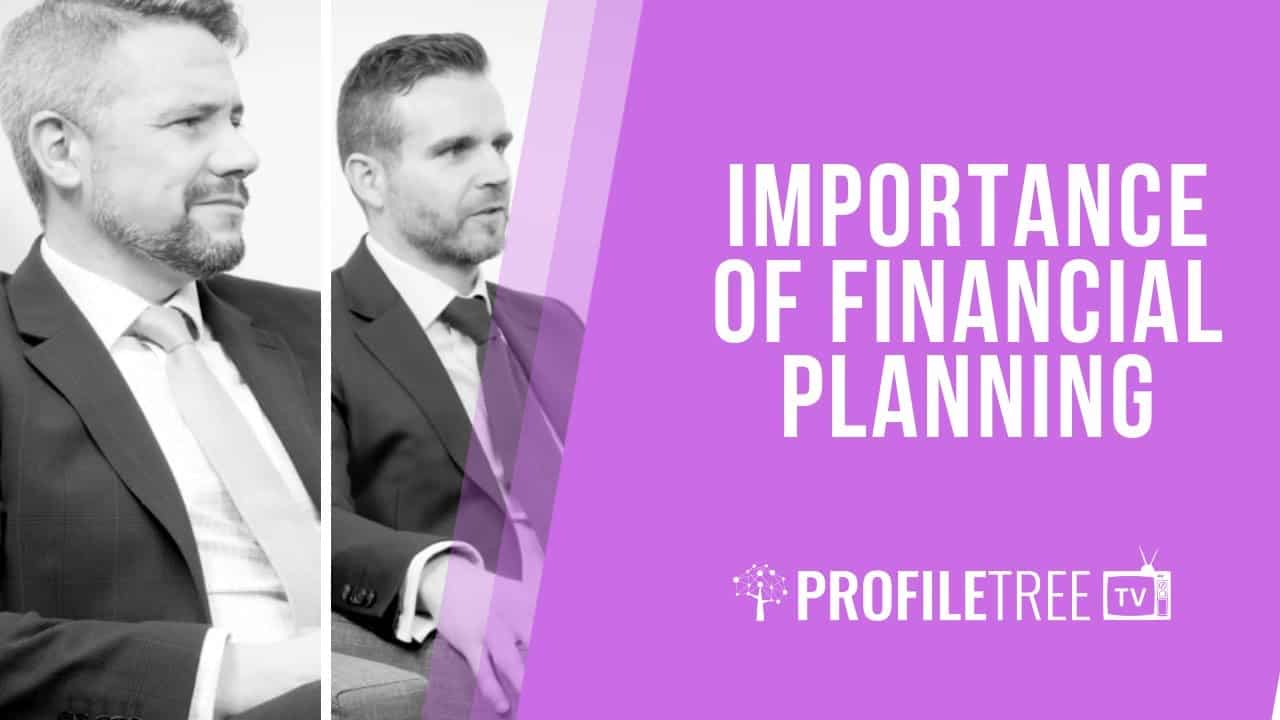With lockdown restrictions having impacted businesses across Europe, the vast majority of us have been forced to slow things down to some degree. However, many business leaders agree that these strange times have given us a unique opportunity to reassess our businesses, our finances and our lives.
In a pre-lockdown interview, we sat down to discuss financial planning with experts Sean Larkin and Peter Savage from Fairstone NI, a leading planning firm based in Northern Ireland.
To learn more about the importance of financial planning and saving for retirement, check out our full Business Leaders interview or read on for the highlights.
Table of Contents

Fairstone NI: Transforming Lives with Financial Planning
Before starting Fairstone NI, business partners Sean Larkin and Peter Savage have built a strong working relationship in previous financial planning work for Barclays. With a shared vision on how the delivery of financial planning advice could be improved, the pair established the company roughly 13 years ago.
As chartered financial planners, the partners have won multiple awards for their work, with Peter’s expertise recognised with the Financial Times’ Moneymarket Retirement Planner of The Year Award in 2017.

The synergy between the partners has developed a business of multiple sectoral experts, with services extending across all aspects of financial services. Whilst Fairstone houses specialists in retirement and estate planning; others offer knowledge in investment; mortgages, corporate companies, as well as medical professionals including consultants and dentists. Sean, Principal Director, suggests that a common misconception of financial planning as a mere ‘product’ – an idea which doesn’t measure up with how it can ultimately transform lives for the good.
The benefits of financial planning are of significant value, offering confidence and peace of mind along with much-needed accountability. However, success is equally dependent on how much we invest in business development, says Sean:
“Myself and the staff at Fairstone strongly believe in the value of personal development, and it is really the same when it comes to business – whether that development is through courses, qualifications or personal learning. That allows us to deliver a far better service to our clients, as well as reaching out and securing new clients”.
He also highlights the importance of ongoing learning to keep abreast of constant changes to regulations and industrial legislation.
Whilst it’s true that many businesses seek financial planning services when it’s already too late, acting at the right time can give you full control over your destiny.
“If a client has assets, we can certainly build an achievable financial plan. But the earlier you begin, the easier it will be by the time you arrive at retirement,” explains Peter. “A lot of people consider their retirement to be many years away. However, from my experience working with clients, that time tends to come around very quickly. The importance of financial planning is obvious when they have an opportunity to have a really enjoyable retirement. A retirement where they may choose to work because they want to, not because they have to.”

Facilitating the Path to Financial Stability
Reaching out to chartered professionals such as those at Fairstone can help you develop a trackable, actionable plan towards future financial stability. Working and regularly updating your financial planning can help you consider potential changes to your personal circumstances, as well as changes to your financial status, business model or your overall strategy.
“We can adapt your financial plan to ensure that you won’t be impacted by situations that come down the line. Ultimately, it’s my job to help clients facilitate those changes,” adds Peter.
Sean Larkin suggests that much of financial planning involves persuading individuals to change their mindsets. “It’s part of our culture that we also like to build our wealth to pass onto the next generation. However, we do try to remind our clients that they have worked hard to earn that money, and that they should enjoy the money while they can. We advise you to lead the best life that you can lead.
You can always ensure that the rest of your assets are passed onto the next generation in a very protective manner. It’s about challenging clients on what they think they should do with their money, and to encourage them to have a little more fun with it along the way.”
Peter jokes that Fairstone NI like to think of themselves as a ‘family company’ – and that’s not because they are related. “It’s because we can deal with the family as a whole. That includes the younger members of the family who may be wanting to get on the property ladder through mortgage, or maybe a bit of protection. That goes right through to our older clients in retirement who have accumulated their wealth and are looking for financial advice. In essence, we are a general practitioner of financial advice.”
What comes next for Peter, Sean and the rest of the team at Fairstone? The partners are mutually focussed on developing the long-standing reputation of their company, with their sights set on becoming Northern Ireland’s leading provider of financial services.
“We also want to continue to offer our clients the best possible service, and the services that are right for them,” finishes Peter. “Our incoming business depends on individuals coming to us for our leading expertise. We want to continue to lead in the service we offer – and that’s the plan for the future.”

Those wishing to learn more about the benefits of financial planning and the range of services offered by Fairstone NI can do so by visiting the company’s official website.
Getting Your Finances in Order: A Step-by-Step Guide
Taking control of your finances can feel overwhelming, but it doesn’t have to be. By following these steps, you can gain a clear picture of your current situation and create a plan for a more stable and secure future.
1. Assess Your Current Financial Situation:
Think of this as your financial snapshot. Gather important documents like bank statements, pay stubs, credit card bills, and loan statements. Then, consider the following:
a) Calculate Your Net Worth:
This is the difference between your assets (what you own) and liabilities (what you owe). Assets include cash, savings, investments, retirement accounts, and the value of your car and home (minus any outstanding loans). Platforms now enable consumers to instantly apply for loans online based on financial profiles. Liabilities include mortgages, car loans, credit card debt, student loans, and personal loans.
b) Analyze Your Cash Flow:
Track your income (salary, side hustles, investments) and expenses (bills, groceries, entertainment) for a month to understand where your money goes. Categorize expenses to identify areas where you can cut back or optimize spending.
c) Inventory Your Assets & Liabilities:
List all your assets and their estimated value. Then, do the same for your liabilities, including interest rates and minimum payments. This comprehensive list will help you see your financial landscape clearly.
2. Set a Budget Aligned with Income and Expenses:
Now that you understand your spending habits, create a budget to manage your money effectively. Choose a budgeting method that suits you, such as the 50/30/20 rule (50% needs, 30% wants, 20% savings/debt) or the zero-based approach (allocating every dollar of income).
Here are some resources to help you budget:
- Mint: A free budgeting app that tracks your spending and income automatically.
- YNAB: A subscription-based app that helps you give every dollar a purpose.
- Personal Capital: A free platform that offers budgeting tools, investment tracking, and net worth monitoring.
3. Build an Emergency Fund:
Aim to save 3-6 months of living expenses in an easily accessible account to cover unexpected costs like car repairs or medical bills. This safety net will provide peace of mind and prevent you from relying on high-interest debt in emergencies.
4. Pay Down Debt:
High-interest debt can quickly spiral out of control. Prioritize paying off credit cards and other high-interest loans first. Consider debt consolidation or snowball/avalanche methods to accelerate your debt repayment journey.
5. Invest for Your Future:
Once you have a handle on your current expenses and have started building an emergency fund, explore investing for your long-term goals like retirement or a down payment on a house. Start small and gradually increase your contributions as your financial situation improves.
Achieving Your Financial Goals: A Roadmap to Success
Turning financial aspirations into reality requires a clear plan and dedicated effort. Here’s a detailed breakdown to help you achieve your short and long-term monetary goals:
1. Define Your Goals:
a) Short-term Goals (1-3 years):
- Identify: These could be saving for a vacation, down payment on a car, or tackling a specific debt.
- Specificity: Be specific! Instead of “save more money,” aim for “save $5,000 for a vacation within a year.”
b) Long-term Goals (5+ years):
- Dream Big: Retirement, a child’s education, or financial independence are some examples.
- Prioritize: Choose your top 2-3 goals based on importance and impact on your life.
2. Make Them SMART:
Specific: Clearly define what you want to achieve (e.g., “save $20,000 for a down payment on a house”). Measurable: Track your progress with quantifiable metrics (e.g., monthly savings amount). Attainable: Set realistic goals considering your income, expenses, and timeline. Relevant: Align your goals with your values and overall financial plan. Time-bound: Set deadlines to create a sense of urgency and motivate action.
3. Create a Roadmap:
a) Research & Educate:
- Understand the cost of your goals.
- Explore investment options, retirement plans, or debt repayment strategies.
- Seek guidance from financial advisors if needed.
b) Break it Down:
- Divide your long-term goals into smaller, manageable milestones.
- Determine monthly or annual savings amounts needed.
c) Identify Resources:
- Allocate additional income from side hustles, reduced expenses, or tax refunds.
- Consider leveraging existing resources like employer-matched retirement plans.
d) Implement & Track:
- Automate savings transfers to build momentum.
- Monitor progress through budgeting apps or spreadsheets.
- Celebrate milestones and adjust your plan as needed.
Additional Tips:
- Focus on Progress, Not Perfection: Don’t get discouraged by setbacks. Consistency is key.
- Seek Support: Share your goals with trusted friends or family for accountability.
- Stay Motivated: Visualize your goals and remind yourself of the positive impact achieving them will have on your life.
- Adapt & Be Flexible: Circumstances change, so adjust your plan as needed without sacrificing your long-term vision.
Remember, achieving financial goals requires commitment, discipline, and smart planning. By setting clear goals, making a roadmap, and taking consistent action, you can transform your financial dreams into reality.
Preparing for Emergencies: Building a Resilient Financial Fortress
Life throws curveballs, and being prepared for the unexpected is crucial for financial stability and peace of mind. Here’s a detailed guide to help you weather those stormy days:
1. Build an Emergency Fund:
Imagine a leaky roof during a downpour. Your emergency fund is your metaphorical umbrella, shielding you from financial stress when unforeseen events occur. Ideally, aim for 3-6 months of living expenses (rent/mortgage, bills, groceries) in an easily accessible account. Here’s why it’s important:
- Peace of Mind: Knowing you have a safety net reduces anxiety and allows you to focus on resolving the emergency.
- Prevents Debt: Avoid high-interest loans or credit card debt to cover unexpected costs.
- Maintains Stability: Emergencies shouldn’t derail your long-term financial goals.
2. Identify Potential Risks and Costs:
Different life stages come with different risks. Consider:
- Job Loss: Can you sustain expenses without income for a while?
- Medical Emergencies: High deductibles or uncovered procedures can be costly.
- Home or Car Repairs: Major breakdowns can put a strain on your budget.
- Natural Disasters: Flood insurance or emergency supplies might be necessary.
Research average costs associated with these risks to inform your emergency fund target.
3. Insure Against Emergencies:
Insurance acts as a safety net when emergencies exceed your emergency fund. Consider:
- Health Insurance: Minimize out-of-pocket medical expenses.
- Disability Insurance: Protects your income if you’re unable to work due to illness or injury.
- Life Insurance: Provides financial security for your loved ones in case of your passing.
- Property and Auto Insurance: Covers damage or loss to your home, car, and belongings.
Choose coverage levels based on your individual needs and risk tolerance.
4. Additional Tips:
- Diversify Your Savings: Keep parts of your emergency fund in easily accessible accounts but consider higher-yield options for portions you won’t need immediately.
- Review Regularly: Reassess your needs and adjust your emergency fund target and insurance coverage as your life evolves.
- Prepare a Plan: Outline steps to take in different emergency scenarios, including contacting insurance companies or accessing emergency services.
- Reduce Reliance on Debt: Minimize non-essential debt payments to free up more cash for unforeseen situations.
Building a resilient financial fortress requires proactive planning and consistent effort. By prioritizing an emergency fund, understanding potential risks, and leveraging insurance strategically, you can face life’s unexpected storms with confidence and financial stability. Remember, a prepared mind and a well-stocked financial toolkit are your best weapons against the unpredictable nature of life.
Saving and Investing Wisely: Building Your Financial Future
Saving and investing are the cornerstones of financial security and achieving your long-term goals. Here’s how to navigate these crucial steps wisely:
1. Leverage Workplace Retirement Plans:
These plans offer several advantages:
- Employer Contributions: Many employers match a portion of your contributions, essentially giving you free money!
- Tax Advantages: Contributions often reduce your taxable income, saving you money on taxes.
- Automatic Deductions: Set up automatic contributions to build your retirement nest egg effortlessly.
Explore your plan options, like traditional and Roth IRAs, and contribute at least the minimum required to get the full employer match. Consider increasing your contributions gradually as your income allows.
2. Open Individual Retirement Accounts (IRAs):
If your workplace plan doesn’t offer employer contributions or doesn’t meet your needs, explore IRAs:
- Traditional IRAs: Contributions may be tax-deductible, and your earnings grow tax-deferred until withdrawal in retirement.
- Roth IRAs: Contributions are made with after-tax dollars, but your earnings grow tax-free, and qualified withdrawals in retirement are tax-free too.
Choose the option that aligns with your tax situation and retirement goals. Remember, annual contribution limits apply to both types of IRAs.
3. Invest for the Long Term:
Investing helps your money grow faster than inflation, allowing you to achieve your long-term goals like a comfortable retirement, a down payment on a house, or funding your child’s education. Here are some basics to get you started:
- Asset Allocation: Diversify your investments across different asset classes like stocks, bonds, and real estate to manage risk and optimize returns. Start with a conservative allocation based on your age and risk tolerance, gradually adjusting as you get closer to your goals.
- Time Horizon: Understand your investment timeline. For long-term goals, ride out market fluctuations as your investments have time to recover and grow.
- Low-Cost Options: Consider index funds or ETFs that offer broad market exposure with low fees, suitable for beginners or those seeking a hands-off approach.
Additional Tips:
- Educate Yourself: Learn about different investment strategies, financial products, and market trends. Read books, listen to podcasts, or consult a financial advisor.
- Start Small: Begin with a manageable amount and increase your contributions as you gain confidence and knowledge.
- Automate Investments: Set up automatic deposits into your investment accounts to build wealth consistently.
- Review Regularly: Reassess your portfolio and investment strategy periodically to ensure they align with your evolving goals and risk tolerance.
Remember, saving and investing are journeys, not destinations. By starting early, leveraging available options wisely, and staying consistent, you can build a solid financial foundation for a brighter future. Don’t hesitate to seek professional guidance if needed, but empower yourself with knowledge and take control of your financial journey.
Working with a Financial Planner: Your Guide to Personalized Financial Wisdom
Navigating the complex world of finance can feel overwhelming, especially when juggling life’s many demands. That’s where financial planners come in, offering personalized guidance and expertise to help you achieve your financial goals. Here’s a detailed look at how working with a financial planner can benefit you:
1. Customized Plans for Your Unique Needs:
There’s no “one-size-fits-all” approach to finances. A good financial planner takes the time to understand your unique situation, including income, expenses, goals, risk tolerance, and family dynamics. From there, they create a personalized plan tailored to your specific needs and aspirations.
2. Expert Guidance on Multiple Fronts:
Financial planners offer a wealth of knowledge across various financial areas:
- Goal Setting: Whether it’s saving for retirement, a child’s education, or a comfortable lifestyle, they help you define and prioritize your goals.
- Saving Strategies: They identify the most effective ways to save money based on your income and goals, considering options like IRAs, budgeting strategies, and optimizing employer-sponsored plans.
- Investment Advice: They assist you in choosing the right investment mix based on your risk tolerance and timeframe, guiding you through asset allocation and navigating different investment vehicles.
- Debt Management: They offer strategies to manage and pay down debt effectively, reducing your financial burden and improving your overall financial health.
- Retirement Planning: They help you determine how much you need to save for a comfortable retirement and guide you through various retirement options and strategies.
- Estate Planning: They can collaborate with your estate planning attorney to ensure your assets are distributed according to your wishes and your loved ones are financially protected.
3. Continuous Support and Monitoring:
A financial planner doesn’t simply create a plan and disappear. They provide ongoing support and monitoring, regularly reviewing your progress, adjusting your plan as needed, and addressing any questions or concerns you may have. This ensures your financial strategies remain aligned with your evolving life and goals.
Choosing the Right Financial Planner:
- Qualifications: Look for someone with relevant certifications and experience.
- Fiduciary Duty: Choose a planner who acts in your best interests, not their own.
- Fees: Understand their fee structure and ensure it aligns with your budget.
- Communication Style: Find someone you feel comfortable communicating openly with.
FAQs: Working with a Financial Planner
1. Is financial planning expensive?
Fees vary depending on the planner’s experience, qualifications, and the complexity of your financial situation. Some charge hourly rates, while others have retainer fees or asset-based fees. Ask about different fee structures and discuss what works best for you.
2. What questions should I ask a potential financial planner?
- What certifications and experience do you have?
- Are you a fiduciary advisor?
- What is your fee structure?
- How often will we meet?
- What is your investment philosophy?
- Do you specialize in any specific areas like retirement planning or tax strategies?
3. How often should I meet with my financial planner?
The frequency depends on your needs and complexity of your situation. Some individuals prefer quarterly meetings, while others benefit from annual check-ins. Discuss your preference with your planner.
4. What happens if I disagree with my planner’s recommendations?
Open communication is essential. Discuss your concerns openly and explore alternative options. Ultimately, the decision lies with you, but your planner can provide insights and data to help you make informed choices.
5. Can I work with a financial planner if I have limited assets or savings?
Absolutely! Many planners work with people in various financial stages. They can help you create a budget, manage debt, and develop a plan for future growth.
Conclusion: Partnering for Financial Success
Working with a financial planner can be a transformative experience. Their expertise, personalized guidance, and ongoing support can empower you to take control of your finances, navigate life’s financial challenges with confidence, and achieve your financial goals with greater clarity and peace of mind.
Remember, investing in your financial well-being is an investment in your future. Take the first step and explore the benefits of working with a qualified financial planner today.
Become a Part of Our Business Leaders Series
Interested in featuring on our Business Leaders series? In our acclaimed series, we share amazing advice, tips and stories from business owners, managers and senior leaders.
From growing your business to looking after your staff, new industry insights and innovative ideas – we cover everything to inspire professionals across all sectors. If you want to become a part of it, simply drop us a message.


